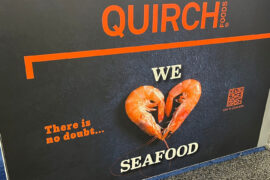The flagship factory of Pickenpack, a name synonymous with the seafood industry in Germany for more than a century, is scheduled to close on June 30. Shutdown of the Lüneburg plant, which since 1975 has transformed frozen fish blocks and other raw material into breaded, battered, sliced, portioned, pre-formed, molded and fully-cooked value-added products, will put approximately 400 people without work.
The financially troubled firm, doing business as Pickenpack Holding Company, voluntarily filed for bankruptcy in December of 2015. Ranked as the leading packer of private label frozen pollock-based ready meals, fish sticks and fillets for deep discount chains in Germany and a significant supplier to other food retailers in Europe, its output has amounted to approximately 85,000 tons in recent years. Turnover has been about EUR 275 million per year, including sales generated by The Seafood Trader (TST), a sister company.
 “As a result of all the discussion (with possible buyers that reportedly included Bregal Partners, Greenland Seafood and Orlando Management), it has been shown that an investor for the takeover of the whole group, including Lüneburg, cannot be found,” employees were informed on March 31 by insolvency administrator Friedrich von Kaltenborn-Stachau of Boege Rohde Luebbehuesen (BRL), a Hamburg-based law firm.
“As a result of all the discussion (with possible buyers that reportedly included Bregal Partners, Greenland Seafood and Orlando Management), it has been shown that an investor for the takeover of the whole group, including Lüneburg, cannot be found,” employees were informed on March 31 by insolvency administrator Friedrich von Kaltenborn-Stachau of Boege Rohde Luebbehuesen (BRL), a Hamburg-based law firm.
It is still hoped that a buyer will take over the Pickenpack plant in Riepe, near Emden. Meanwhile, deliveries of finished products from are expected to continue to be made to retail customers while the factories operate under the administration of BRL.
Long and Deep History
The company was founded by Julius Pickenpack as a trawler fishing business in Altona (now part of Hamburg) during 1906. Family owned and operated for several generations, it began specializing in commodity frozen fish products in the mid-1950s and geared up production of private label value-added seafood dishes and ready meals in earnest during the 1970s.
 Brothers Jan and Thies Pickenpack set a new course for the company in the 1980s, following implementation of the United Nations Convention on the Law of the Sea’s 200-mile exclusive economic zone (EEZ), which affected marine resource harvesting and dramatically changed the raw material supply scene.
Brothers Jan and Thies Pickenpack set a new course for the company in the 1980s, following implementation of the United Nations Convention on the Law of the Sea’s 200-mile exclusive economic zone (EEZ), which affected marine resource harvesting and dramatically changed the raw material supply scene.
When this writer first interviewed Jan Pickenpack in 1986, the managing director remarked: “A country with no coasts has no chance today to succeed in the fishing business, because of political considerations. Rather than become involved in a state-subsidized trawler association, as an independent private company we decided to get out of that business.”
Pickenpack wasted no time in charting a new course and further embracing opportunities in the growing value-added segment of the frozen fish market, saving more than 500 jobs in the process. Significant investments were made to modernize facilities and boost freezing and cold storage capacity, as well as ramp up marketing and sales efforts for an expanding line of private label fish products ranging from naturally-shaped Alaska-Seelachs Filets and Grill-Filets to Pollock Portions in Sauce.
The company was sold to the Gild Buy-Out Fund in 1999, and it merged with Hussmann & Hahn in 2003. Since then the assets have changed hands several times, going to the Reykjavik-based Icelandic Group in 2005 and later to Hong Kong-headquartered Pacific Andes and a consortium of investors.
The Pickenpack factory in Lüneburg has been scaling back its workforce for a number of years to stay solvent and remain operational in a highly competitive environment. In July of 2014 the company’s payroll was cut by approximately 170 persons as the size of the facility was reduced and two production areas were closed. Bar the appearance of a “white knight” investor between now and the end of June, it is likely that the end of an era will come to pass. – Reported by John Saulnier





